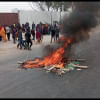Bangladesh's first commodity exchange by this year

The Chittagong Stock Exchange (CSE) is planning to launch the country's first commodities exchange, or futures market, this year, aiming to reduce the price difference of commodities between what consumers pay and what producers get.
Insiders say the opening of the commodity exchange may enable buyers and producers to buy and sell goods at competitive prices and reduce the scope of manipulation in the commodity market now alleged to have been rampant in domestic trades.
"Our producers lament that they don't get fair prices while consumers are paying far too much. Such disparities may dissipate through the commodities exchange," said Shaikh Shamsuddin Ahmed, commissioner of the Bangladesh Securities and Exchange Commission (BSEC).
Sometimes, farmers throw away their potatoes, tomatoes and other agricultural products in anguish over the low prices stemming from inefficient market mechanisms.
To make the market efficient and ensure proper export and import, a commodities exchange is necessary in Bangladesh, he said, adding that for this the BSEC was planning for a futures market.
A commodities exchange is a legal entity that determines and enforces rules and procedures for trading standardised commodity contracts and related investment products.
Traders rarely deliver any physical commodities through a commodities exchange.
Instead, they trade futures contracts, where the parties agree to buy or sell a specific amount of the commodity at an agreed-upon price, regardless of what it currently trades at in the market at predetermined expiration date.
According to experts, a commodity exchange allows farmers to lock in prices using forward contracting. This also reduces the risk of a drastic price drop.
An exchange helps increase the liquidity for farmers since it assists them to access funds without any interest. As a result, they don't need to borrow at higher interest rates from sources such as banks or usurers.
In order to launch the market, the port city bourse is scheduled to sign a memorandum of understanding (MoU) with the Multi Commodity Exchange of India (MCX) tomorrow to appoint it as a consultant.
In 2003, MCX became one of the first exchanges to open in India.
It provides a platform for price discovery and risk management across varied segments, including industrial metals, energy and agricultural commodities.
MCX will recommend bylaws and regulations based on generic regulatory compliance and international best practices, products, clearing and settlement methods, trading and surveillance systems and warehousing, delivery infrastructure and partnership models.
It will also suggest reference pricing mechanisms, setting of spot price and functionalities of a price advisory committee; employ third-party data and practical market trends; train stakeholders on the market; and develop a five-year consolidated business plan.
MCX will share sample business rules so that the CSE can develop or customise that of its own to expedite the project.
In Bangladesh, the government took an initiative to establish a commodity exchange in 2007. But the initiative did not translate into reality owing to complexities over warehouses and the lack adequate eligible traders, said AB Mirza Azizul Islam, the then finance adviser to the caretaker government.
"The country also lacked necessary infrastructure of warehouses," he told The Daily Star yesterday.
The CSE, which got the preliminary nod to establish the exchange from the BSEC last year, is hopeful of rolling out the exchange within the current year. The BSEC expects to preliminarily include gold, industrial raw materials such as iron ore, and agricultural products, namely tea to the exchange.
The exchange will facilitate the participation of farmers alongside financing for them while the producers will have to avail of insurance.
BSEC Commissioner Ahmed said there was a global demand for some of the country's agricultural products such as tea and jute, and the use of the exchange, even for the export of the products, would enable producers to secure fair prices.
"Some of our crucial products are imported by a few enterprises, so the prices and quality are wholly determined by their actions," he said.
"The exchange would help break up the syndicate, subject to efficient handling," he added.
Bangladesh's demand and import of commodities are of such a huge volume that it sometimes goes on to affect product prices at the Chicago Board of Trade (CBOT), he said. The CBOT is the world's largest commodities exchange established in 1848.
As with any developing country, Bangladesh needed such an exchange in its formative years to have an efficient commodities market in place.
Among the neighbouring countries, India and Nepal have a number of commodities exchanges.
The earliest recognised futures trading exchange is the Dojima Rice Exchange, established in Japan in 1730 for the purpose of trading rice futures.
Pakistan and Nepal established the commodity exchange in 2007 and 2009, respectively.
Among the African nations, Ethiopia initiated the commodity exchange market in April 2008 followed by Kenya.
The African commodity exchanges trade only agricultural produces, while the Indian commodity exchanges are trading many goods, including cash crops, food grains, plantations, spices, oil seeds and metals.
Pakistan's commodity exchange market trades gold, cotton, yarn, sugar, rice and wheat, while Nepal allows trading of cash crops, food grains, vegetables, spices, oil seeds, metals and bullion.
Bangladesh imports a huge amount of commodities, so the commodities exchange will safeguard against price fluctuations, said Sadeq Zaman, associate director of PwC Bangladesh.
"Instead of a set price, it would work for establishing a competitive price."
"As the MCX has a lot of experience and with economic conditions being similar, their inclusion will hugely benefit us," he said.
However, it will take time to reap the benefits as the exchange is just coming into existence, he added.
The market's objective is to reduce the price gap between the consumers' end and producers' end, said Md Ghulam Faruque, acting managing director of the CSE.
It will also help discover a future price, so producers will be able to realise the future price of a product. "So, once agricultural products are included in the exchange, our farmers will be benefitted."
In the first phase, the target is to trade gold, cotton and crude oil.
"The team of the MCX will work finding which goods would be feasible for our market. Then we will decide on the final products," said Faruque.
The market will run on a non-delivery cash settlement system, so warehouse infrastructure is preliminarily not necessary, he said, adding that the CSE would mainly need IT infrastructure to operate the exchange.
"People have little knowledge about it so the technical know-how is also necessary. We will provide training to our stakeholders with the help of the MCX."

 For all latest news, follow The Daily Star's Google News channel.
For all latest news, follow The Daily Star's Google News channel. 








Comments